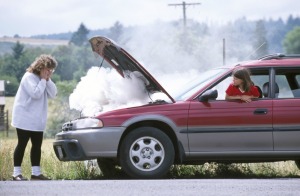 My '98 Buick Century started overheating one day. It was low on water, so we filled it up only to have it overheat again. We replaced the water pump and put a new thermostat in. It is still overheating and losing water, but the water is not going on the ground and there is none in the oil. We're assuming it's not going into the engine block. Can anyone tell me what we should do next? I'd really appreciate any kind of hints to help out. Thank you!
My '98 Buick Century started overheating one day. It was low on water, so we filled it up only to have it overheat again. We replaced the water pump and put a new thermostat in. It is still overheating and losing water, but the water is not going on the ground and there is none in the oil. We're assuming it's not going into the engine block. Can anyone tell me what we should do next? I'd really appreciate any kind of hints to help out. Thank you!
By Jackolyn Smith from GA
Check into the heater core, too. I've had Buicks, and they're famous for overheating. Twice the problem was in the heater core, and it leaked water and antifreeze onto the floor on the front passenger side inside the car - the carpet was wet and I could smell the antifreeze when I drove. The first time it happened, I couldn't understand what it was, but the mechanics knew right away!
By the way, you shouldn't just put water into your radiator; the mechanics also advised me that it should be 50-50 water and antifreeze, because the antifreeze has ingredients in it that protect the system against rust, and also helps prevent overheating, somewhat. Cars need antifreeze, even where the temperature doesn't get to freezing or below.
Here are the questions asked by community members. Read on to see the answers provided by the ThriftyFun community.
My '98 Buick Century started overheating. My husband put in a new water pump, new hoses, and a new thermostat. We thought it was fixed, but now it's losing water somewhere, not on the ground. Also, the heater isn't blowing hot air. And the "low coolant" light is on. Oh, and he also blew out the radiator and the heater core. Can someone please tell me what else could be wrong with it?
Thank you in advance!
By Jackie S
I've had that happen with Buicks I owned, and it turned out to be the heater core. Check the floor in front on the passenger side - if it's wet, that's where the antifreeze - water combination is going when the heater core leaks.